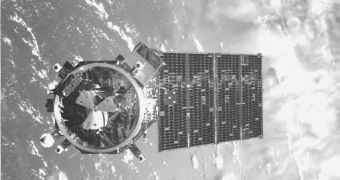The two satellites of the Orbital Express mission, the Autonomous Space Transport Robotic Operations (ASTRO) vehicle and a prototype modular next-generation serviceable satellite (NEXTSat) successfully reunited after they were separated by 7 kilometers.
One of the main purposes of the mission is to test the ability of future spacecraft to couple in space without human intervention. Autonomous docking technologies are vital for future autonomous robotic missions to the Moon and Mars, where the great distance to the Earth makes it hard for communications to be received in real time.
ASTRO grabbed its brother with its robotic arm and performed successful maintenance on it with almost no help from mission control. Almost is the keyword here, as controllers noticed the two spacecraft were misaligned and were forced to move the satellites themselves, so they could dock together.
"This scenario marks the second successful grapple and capture of the NextSat by the ASTRO using its robotic arm," reads a statement posted on DARPA's Orbital Express website.
The $300 million Orbital Express mission ultimately hopes to achieve autonomous docking, without help from ground controllers, something no US spacecraft has previously been able to do. It also refueled NextSat, installed new batteries and used the robotic arm to operate on NextSat and itself.
"This demonstration mission is the first step toward developing an operational system that can service satellites and support other space operations," says George Muellner, president of Boeing Advanced Systems, which built ASTRO.
NASA plans for an extended mission were abandoned and the spacecraft are scheduled to be de-orbited at some point between 2 and 9 July 2007.
While some people speculated that satellites that navigate autonomously and inspect other spacecraft could also be used in the future to disable enemy satellites, officials say Orbital Express is not designed to be used as an attack vehicle.

 14 DAY TRIAL //
14 DAY TRIAL //